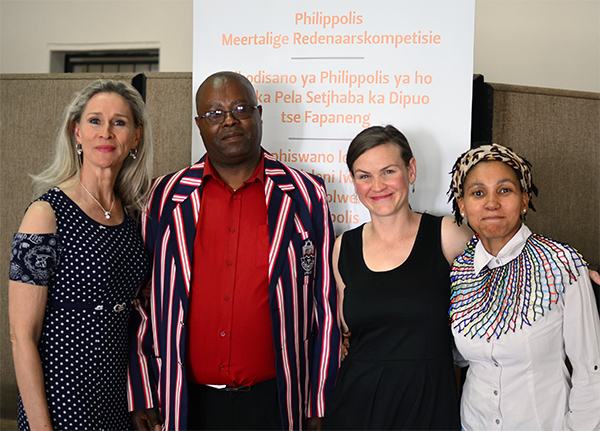Latest News Archive
Please select Category, Year, and then Month to display items
11 September 2024
|
Story Anthony Mthembu
|
Photo Anthony Mthembu and Chelsea Carolus
 From the left: Geraldine Lengau, Senior Officer in the Unit for Institutional Change at the UFS; and Oratile Reina, West College Prime.
From the left: Geraldine Lengau, Senior Officer in the Unit for Institutional Change at the UFS; and Oratile Reina, West College Prime.
As part of the initiatives lined up for College Week, the student leaders of West College at the University of the Free State (UFS) hosted a dialogue that primarily focused on discussing social justice as a value of Vision 130. The dialogue was held at Outeniqua Residence on 3 September 2024 and was well attended by students within West College.
According to Oratile Reina, West College Prime, “the motivation for the dialogue was to prepare newly elected leaders and our college community to align their efforts with Vision 130 – a vision that aims to create a more inclusive, equitable, and socially just environment on campus”. As such, she highlights that the dialogue was an opportunity for leaders to discuss practical strategies for implementing these values in their respective spaces, and to encourage those in West College to become better citizens inside and outside the university.
A conversation on social justice
The dialogue was facilitated by Geraldine Lengau, Senior Officer in the Unit for Institutional Change and Social Justice at the UFS. Lengau touched on several aspects pertaining to the topic of discussion. Firstly, she allowed the audience to give their definition of social justice, especially as students within the institution. In addition, she went on to talk to the audience about sexual assault in the context of social justice. In this instance, Lengau gauged whether the students knew which processes to follow in the event of a sexual assault incident, and whether they were acquainted with the UFS Sexual Harassment, Sexual Misconduct, and Sexual Violence Policy. Furthermore, the audience was given the opportunity to outline what social justice looks like to them in the spaces they occupy, including in their respective faculties, the sports they play, and the leadership structures they form part of. “I was encouraged to see that students take their right to a socially just university in very high regard, and that they were willing to break it down from what Vision 130 proposes, in order to align it with their common understanding,” said Lengau.
As the dialogue concluded, the audience signed a pledge committing to uphold the values of Vision 130. According to Reina, “The pledge represents a promise to take concrete steps towards fostering an inclusive and equitable campus culture. By signing the pledge, the leaders are not only agreeing to embody these principles in their leadership roles but are also holding themselves accountable to their peers and the broader university community.”
Competition emphasises value of mother-tongue education
2017-11-02

At the recent Multilingual Debating Competition were, from the left: Anita Muller,
local facilitator; William Magwa, master of ceremonies; Dr Chrismi-Rinda Loth,
project coordinator in the Unit for Language Facilitation and Empowerment; and
Mabatho Ntsieng, project facilitator in Community Engagement.
Photo: Supplied
The Multilingual Public Speaking Competition has been an annual event in Philippolis since 2013. The competition was established as a result of the Multilingual Information Development Programme (MIDP), a project sponsored by the province of Antwerp in Flanders, Belgium.
The competition is jointly hosted by the Unit for Language Facilitation and Empowerment (ULFE) at the University of the Free State (UFS) and the Department of Community Engagement, also from the UFS.
Debating in your home language
Grade 6 to 9 learners from four schools participated in this year’s competition. Bergmanshoogte Intermediate School, Madikgetla Primary School, Williamsville Primary School, and Springfontein Primary School each entered their three best speakers per grade.
Olerato Tshiloane, a Grade 7 learner from Madikgetla Primary School, was named best speaker overall.
Everyone debated on ‘Heritage’
The overall theme of this annual event was ‘Heritage’. Thirty six learners debated in their mother tongue on aspects of this theme, such as its definition, the role it plays in their lives, and the importance thereof. According to Dr Chrismi-Rinda Loth from ULFE, learners have to present their speeches in their mother tongues. “This emphasises the value of the mother tongue/home language within a teaching context,” she says.
This year’s competition saw 20 Afrikaans speeches, 13 in Sesotho, and three in isiXhosa. The multilingual adjudication panel was composed of teachers from the participating schools, and the head adjudicator from the Afrikaanse Taal- en Kultuurvereniging (ATKV). The ATKV is a partial sponsor of the competition and also provides the participation certificates.
Dr Loth says ULFE and Community Engagement are looking forward to continue their collaboration, thus contributing to the empowerment of the community.